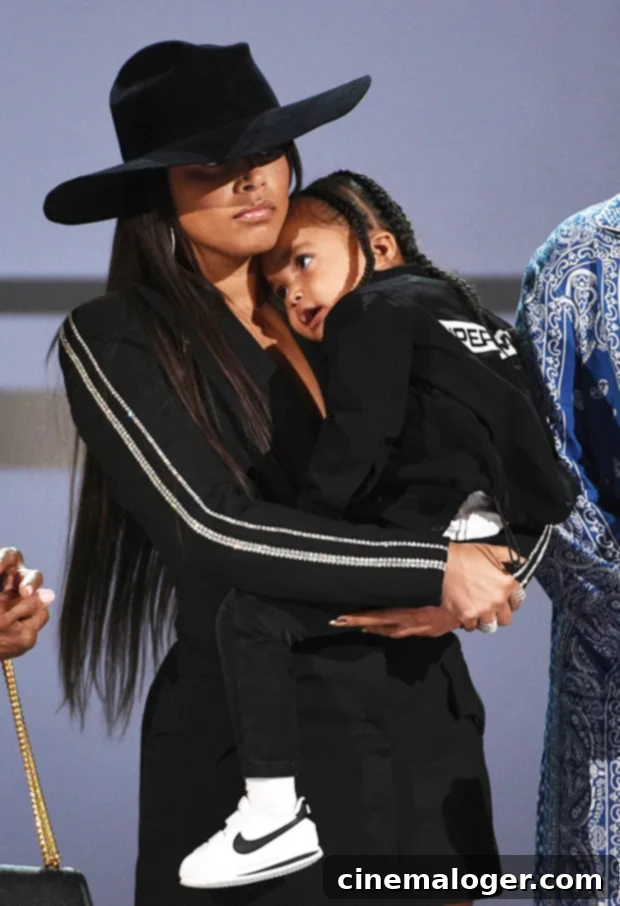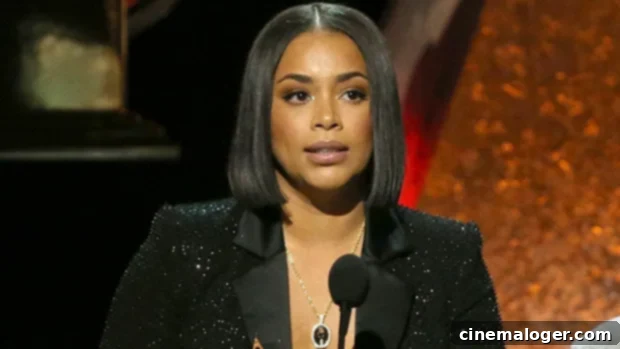Lauren London’s Unwavering Mission: Protecting Black Sons Amidst Police Brutality and Gun Violence
In a profoundly moving episode of Red Table Talk, host Jada Pinkett Smith dedicated a powerful discussion to the harrowing realities faced by women impacted by gun violence. Joining her was acclaimed actress and mother Lauren London, who candidly shared her insights on raising her two Black sons, Kameron (10) and Kross (3), in a world where interactions with law enforcement can be fraught with peril. Jada posed the critical question to Lauren: “So you’re raising two Black boys. As a mother, what are some of your precautions or some of your messaging?” London’s response was both direct and poignant, emphasizing the vital lessons she imparts: “What I instill in them is more about the police. How to handle yourself when you get pulled over. That’s more of my education, protecting them being Black men in America.” This statement resonated deeply, highlighting the unique and often terrifying burden placed upon Black mothers to prepare their children for a society that does not always guarantee their safety or justice.

The Enduring Impact of Gun Violence and Personal Loss
Lauren London’s journey is one marked by profound resilience in the face of unspeakable tragedy. Her intimate familiarity with the devastating consequences of gun violence and systemic injustice stems from a deeply personal loss. In March 2019, the world mourned with her as she lost her beloved partner, Grammy-nominated rapper and community activist Nipsey Hussle. He was senselessly murdered outside his Marathon Clothing store in South Los Angeles, an act that sent shockwaves through the community and beyond. Nipsey was more than just a musical artist; he was a visionary entrepreneur and a dedicated philanthropist who invested tirelessly in his neighborhood. He championed economic empowerment, provided mentorship to local youth, and inspired countless individuals to strive for greatness. His death left an irreplaceable void, but in the weeks and months that followed, Lauren, alongside a grieving community, stood united to honor his enduring legacy. They celebrated his unwavering commitment to uplifting his community, his vision for a more hopeful future, and his profound impact on the lives of young people, whose potential he believed in so fiercely.
The pain of losing Nipsey Hussle continues to shape Lauren’s perspective as a mother. She navigates the complex landscape of parenting her sons, Kameron and Kross, with the vivid understanding of how quickly life can change and how vital it is to equip them with the tools to survive and thrive. Her advocacy, though often quiet and deeply personal, speaks volumes about the imperative of protecting Black lives and fostering an environment where young Black men can live without constant fear. This lived experience informs every piece of advice she gives her sons, transforming abstract warnings into tangible lessons born from the heart of a mother who has experienced the ultimate loss, deeply understanding the systemic issues that contribute to such tragedies.
Addressing Systemic Injustice: The Global Movement for Black Lives
The conversation on Red Table Talk arrived at a critical juncture, unfolding against a backdrop of widespread protests ignited by the May 25, 2020, death of George Floyd. Floyd, an unarmed Black man, died at the hands of police officers in Minneapolis, sparking a global outcry against police brutality and racial injustice. From Los Angeles to major cities across the globe, millions of people took to the streets, marching in solidarity with the Black Lives Matter movement. These protests served as a powerful testament to the collective exhaustion and outrage over centuries of systemic racism and unchecked violence against Black communities. The demonstrations brought unprecedented attention to the urgent need for police reform and accountability. In Los Angeles, Hollywood figures like Ariana Grande, Harry Styles, and Halsey were seen among the demonstrators, lending their voices and platforms to amplify the urgent calls for change and accountability.
For mothers like Lauren London, these events are not distant headlines but deeply personal threats that underscore the urgency of their parenting philosophies. The pervasive nature of police violence means that discussions about racial profiling, self-preservation, and civil rights are not optional but essential components of raising Black children. The ongoing struggle highlights the critical role parents play in educating their children about the biases they may encounter and empowering them to navigate potentially dangerous situations with awareness and dignity. It also emphasizes the immense emotional and psychological toll these conversations take, forcing parents to strip away childhood innocence prematurely in favor of teaching crucial survival skills. The collective trauma experienced by Black communities manifests in these difficult, yet necessary, discussions.

Red Table Talk: Giving Voice to Women’s Unsung Grief
Utilizing her influential platform, Jada Pinkett Smith masterfully guided the conversation to shed light on a frequently overlooked aspect of gun violence and racial injustice: its profound impact on women. She highlighted that women are not merely collateral damage but often direct targets and the enduring bearers of grief and trauma. Jada revealed a staggering statistic: “Nearly 1 million women alive today have reported being shot.” This shocking figure underscores the pervasive nature of violence that extends far beyond headline-grabbing incidents. She then brought into focus the tragic case of Breonna Taylor, an emergency medical worker who was brutally killed on March 13, 2020. “The beautiful Breonna Taylor was struck by eight bullets while sleeping in her own home,” Jada recounted, highlighting the horror of a young woman losing her life in her sanctuary due to a botched police raid. The fact that the officers responsible for Taylor’s death have yet to face charges remains a painful symbol of systemic injustice and the urgent need for police accountability, resonating with cries for justice across the nation.
Jada articulated a crucial point that resonated deeply with the audience: “As we are witnessing our Black men being murdered in the streets, very rarely do we talk about the women who are left behind grief-stricken and shattered.” This statement powerfully reframes the narrative, drawing attention to the often-invisible suffering of mothers, sisters, daughters, partners, aunts, and friends. She underscored this by referencing the families of other victims: “George Floyd has a six-year-old daughter, a sister, a girlfriend. Ahmaud Arbery [has] a mother, a sister. Both men have countless heartbroken women – aunts, cousins, friends – in their lives who love them.” These women become the silent pillars of strength, navigating unimaginable pain while often being tasked with holding families together and carrying the torch for justice. The episode served as a poignant dedication to these women, recognizing their pain, resilience, and unwavering fight for their loved ones. By spotlighting their stories, Red Table Talk amplified a critical dimension of the conversation around violence and systemic oppression, reminding viewers that the cost of injustice extends far beyond the immediate victim, leaving an indelible mark on entire communities.
Parenting Black Sons: Navigating a Complex World with Wisdom and Love
Lauren London’s approach to parenting her sons, Kameron and Kross, is a testament to the profound love and fierce protectiveness that defines motherhood, especially for Black women in America. Her frank discussion about teaching her sons “how to handle yourself when you get pulled over” speaks to a specific, deeply ingrained fear: the fear that a routine traffic stop could escalate into a life-threatening encounter. This isn’t merely about good citizenship; it’s about survival. Parents like Lauren are compelled to teach their children a dual curriculum – one of respect and obedience to authority, and another of self-preservation and awareness of racial bias. This delicate balance requires immense emotional strength and wisdom, as they must impart these lessons without instilling paralyzing fear, but rather a healthy respect for the realities they may face. It is a nuanced education in navigating spaces where their very presence can be misconstrued or met with hostility.
The guidance Lauren provides goes beyond mere instructions; it’s an ongoing dialogue about identity, justice, and resilience. She likely emphasizes the importance of remaining calm, keeping hands visible, speaking respectfully, and knowing one’s rights. These are not lessons typically covered in standard parenting manuals, yet they are indispensable for Black youth growing up in America. For Kameron and Kross, understanding these nuances is as crucial as learning their ABCs or how to cross the street safely. It’s a burden no parent should have to bear, yet it’s a reality that generations of Black families have confronted, passing down essential wisdom for navigating a biased world. Lauren’s openness about this challenge on such a public platform validates the experiences of countless mothers who are silently navigating these same fraught conversations within their homes, hoping for a future where their sons are judged by their character, not their skin color.
A Call for Empathy and Enduring Change
The Red Table Talk episode featuring Lauren London served as a powerful and necessary wake-up call, urging viewers to acknowledge the multifaceted impacts of gun violence and racial injustice, particularly on Black communities and the women who anchor them. Lauren London’s voice, steeped in personal experience and unwavering maternal instinct, became a beacon of resilience and truth. Her dedication to “protecting them being Black men in America” encapsulates the ongoing struggle and the profound love that fuels the fight for equality and safety. This involves not only educating her sons but also holding hope for a future where these conversations are no longer a matter of survival, but rather a historical footnote in a truly equitable society.
The candid discussions on platforms like Red Table Talk are instrumental in fostering empathy, promoting understanding, and galvanizing support for systemic change. They remind us that behind every statistic and headline are real people, real families, and real heartache, whose stories deserve to be heard and acted upon. By shining a light on the specific challenges faced by Black mothers raising Black sons, and by honoring the often-unacknowledged grief of women impacted by violence, Jada Pinkett Smith and Lauren London contribute significantly to a broader movement demanding justice, accountability, and a more equitable future for all. Their shared vulnerability and strength serve as a powerful testament to the enduring human spirit and the relentless pursuit of a world where every child, regardless of their background, can grow up safe, free, and empowered to reach their full potential.
